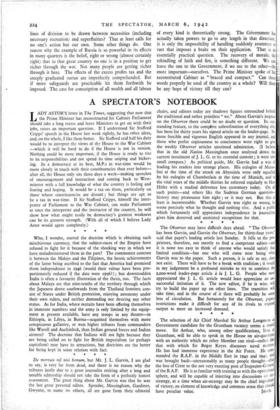De mortuis nil nisi bonum, but Mr. J. L. Garvin,
I am glad to say, is very far from dead, and there is no reason why the tributes justly due to a great journalist retiring after a long and notable editorship should not take the form of a perfectly honest assessment. The great thing about Mr. Garvin was that he was the last great personal editor. Spender, Massingham, Gardiner, Gwynne, to name no others, all are gone from their editorial
chairs, and editors today are shadowy figures entrenched behind the traditional and rather pointless " we." About Garvin's impress on the Observer there could be no doubt or question. Its out- standing feature, to the comptete subordination of everything else, has been for thirty years his signed article on the leader-page. No more forcible and vigorous English appeared in any journal, and those who prefer copiousness to conciseness were right to give the weekly Observer articles unstinted admiration. (I believe that in the old Nation Massingham once analysed down the current instalment of J. L. G. to its essential content ; it went into small compass.) As political guide, Mr. Garvin had a way of leading his readers into strange places. His eulogies of Musso- lini at the time of the • attack on Abyssinia were only equalled by his eulogies of Chamberlain at the time of Munich, and in the vital years of the middle thirties he referred regularly to Hen Hitler with a studied deference less customary today. On all such points—and others like the Sudeten German question- history may pronounce him right ; or it may not. But this at least is incontestable. Whether Garvin was right or wrong, he wrote precisely what he thought and nothing else. _ And a public which fortunately still appreciates independence in journalism gives him deserved and unstinted recognition for that.
* * * *


























 Previous page
Previous page